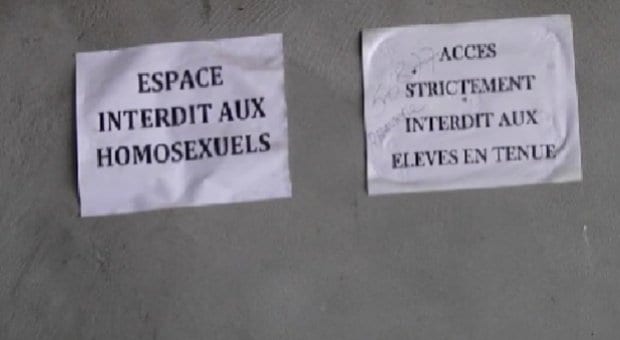A sign in a Yaoundé bar says that homosexuals are not allowed inside.
IPS Television reporter Anne-Mirelle Nzouankeu interviewed the bar’s manager, who told her that he didn’t want any gays in the space. He said the signage was proving to be an effective deterrent.
According to the report, signs like these are an indication that the environment for LGBT people in Cameroon is becoming increasingly hostile.
Activist Serge Douomong, who also spoke with Nzouankeu, added that they could be used “as a good justification to express violence.”
IPS says the government has denied accusations that gays are being targeted.
The report echoes observations made by a human rights lawyer who represents people prosecuted for homosexuality in Cameroon. Alice Nkom says that in the aftermath of a prominent activist’s murder in July, life has become more difficult for gay people.
Nkom has been critical of the way Cameroonian authorities have been handling the case of Eric Lembembe, who was found tortured and killed in his home, saying they haven’t condemned the murder of the activist who had been fighting to decriminalize homosexuality in the African country.
Nkom has also been on the receiving end of threatening phone calls and text messages related to the work she does.
A recent Amnesty International report, entitled “Making Love a Crime: Criminalization of Same-Sex Conduct in sub-Saharan Africa,” notes that there was a ramping-up of efforts to further criminalize queer people in the region in the last 10 years by targeting behaviour or imposing steeper penalties and broadening the scope of existing laws.
“Even in countries where anti-homosexuality laws are not routinely implemented, the existence of the laws alone provide opportunities for abuse, including blackmail and extortion, both by police and by non-state actors,” the report says.


 Why you can trust Xtra
Why you can trust Xtra


